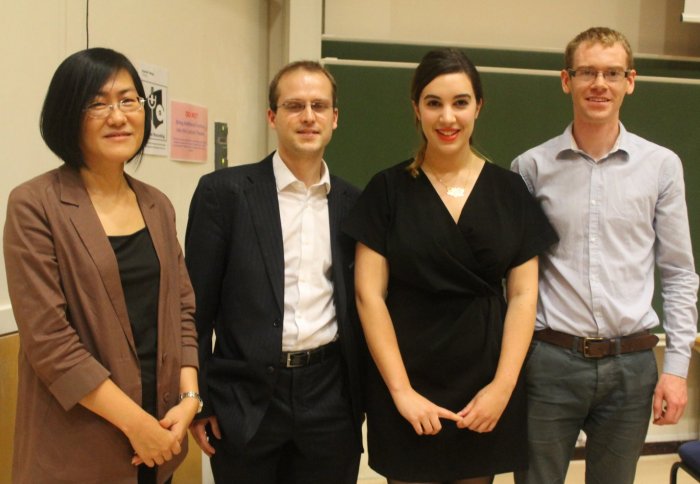PE-CDT Alumni talk About their CDT Experience and Career

Plastic Electronics CDT alumni Dr David James, Dr Alexandra Ramada and Dr Sebastian Wood gave invited talks at the annual PE-CDT Symposium.
The Plastic Electronics CDT was delighted to welcome three of its alumni back to Imperial for the Annual PE-CDT Symposium on Monday 19th September 2016. The alumni were from different cohorts and have taken very different career paths since graduating from the CDT. Here they talk about their experiences of being in the PE-CDT and how the CDT helped them, their careers, and some of their current research.
Dr David James, Research Scientist at Merck UK (Cohort 1)
My time in the CDT was both memorable and challenging. Memorable due to all the friends and contacts I made, the stimulating lectures and all the trips and conferences I got to go on. Best of all though was that the training that I received through the CDT has been directly relevant to the job roles that I had after graduating and the role that I have at Merck today.
Dr Sebastian Wood, Research Scientist at National Physical Laboratory (Cohort 2)
The successful commercialisation of printed electronics requires appropriate techniques for measuring and characterising these materials, with a particular focus on precision and reliability. One of my first projects has been to develop a method for precisely measuring the orientation of conjugated molecules in printed electronic devices, using polarised Raman spectroscopy. This offers important advantages over established X-ray techniques since it can be performed in situ with minimal sample preparation, benchtop apparatus, and with diffraction limited resolution. A second project focuses on the characterisation of defects in printed photovoltaics, where large scale production requires effective defect identification and management. To address this we have developed transient photovoltage/photocurrent mapping, which enables us to examine the functional impacts of different defects in order to understand how critical they are to device performance.
As an alumnus of the Centre for Plastic Electronics, I benefited directly from the opportunities and guidance it offered me at the outset of my career. I started the course with very little knowledge of plastic electronics so the taught courses in the MRes year were invaluable to me, and provided a strong foundation and direction for my PhD and ongoing research projects. I also benefited from the breadth of expertise and ease of interdisciplinary work within the CPE, which enabled me to collaborate widely and fruitfully. The opportunities to travel and attend conferences were also extraordinary: bringing me into contact with countless companies, researchers and institutions all over the world and giving me an appreciation of the broader academic and industrial context of the field of plastic electronics. My experiences in the CPE were an ideal preparation for my current role at the National Physical Laboratory, where I am working on bridging the gap between academia and industry through the development of new characterisation techniques.
Dr Alexandra Ramadan, Postdoctoral Researcher at Oxford University (Cohort 3)
A member of Cohort 3 of the PE-CDT, I worked in the group of Dr Sandrine Heutz. I completed my PhD in September 2015 with my research focussed on examining the structure and morphology of evaporated small molecule semiconductors. I currently work as a postdoctoral research fellow at the University of Oxford in the group of Professor Henry Snaith.
The four years I spent as a part of the Plastic Electronics CDT were challenging, enjoyable and helped me to get my current jobas a postdoctora lresearcher at the University of Oxford. The year spent on the MRes course allowed me to gain a broad understanding of the chemistry and physics underpinning the field whilst exploring areas of research not directly related to my chosen project. I feel this really helped me to become competent quickly in such a multi-disciplinary research field. One of the real highlightsofthe PE-CDTwas the additional training and opportunities which were provided to us outside of traditional research. In particular the annual ethics course was always fascinating and really helped me to develop my ideas of how I should be as a researcher. This was such a valuable opportunity andone which I would never have had if I wasn’t a part ofthe CDT. The winter schools and research symposiums offered great networking opportunities with academics from other institutions and industry. I found these events incredibly useful for developing research collaborations and they even helped me to get my current post at Oxford. My favourite part ofthe CDT was being a part of a cohort of students. Having friends who were working on different but related areas of organic electronics was useful for research and collaboration and provided a really fun and supportive environment in which to work for four years.
Article supporters
Article text (excluding photos or graphics) © Imperial College London.
Photos and graphics subject to third party copyright used with permission or © Imperial College London.
Reporter
Dr Steph Pendlebury
Faculty of Engineering